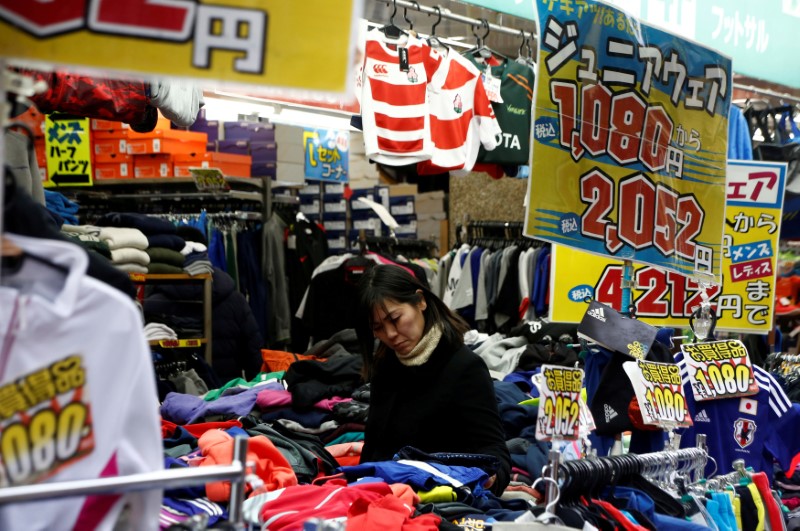 © Reuters. FILE PHOTO – A woman chooses clothes at a shop in Tokyo
© Reuters. FILE PHOTO – A woman chooses clothes at a shop in TokyoBy Leika Kihara
TOKYO (Reuters) – Japan’s annual core consumer inflation slowed to a seven-month low in December as soft household spending kept firms from raising prices, a further sign of the growing challenge faced by the central bank in achieving its elusive 2 percent target.
The data comes ahead of the Bank of Japan’s rate review next week, where the nine-member board is seen cutting its price forecasts and warning of heightening global uncertainties.
The core consumer price index (CPI), which includes oil products but excludes volatile fresh food costs, rose 0.7 percent in December from a year earlier, government data showed on Friday, slowing from the previous month’s 0.9 percent gain.
It fell short of a median market forecast for a 0.8 percent gain and was the slowest pace of increase in seven months.
The data underscores the fragile nature of Japan’s economic recovery, as escalating Sino-U.S. trade frictions and slowing Chinese growth weigh on exports and business sentiment.
Some analysts say core consumer inflation may grind to a halt in coming months as recent oil price falls push down gas and electricity bills, which could put the BOJ under pressure to ramp up an already massive stimulus program.
“Even discounting the oil effect, consumer inflation is weak. That’s because the current economic recovery is driven by the corporate sector and the benefits aren’t passed on much to households,” said Yoshiki Shinke, chief economist at Dai-ichi Life Research Institute.
“Consumption isn’t strong enough to convince companies they can raise prices,” he said, adding that core consumer inflation may approach zero percent around April.
Recent falls in prices were already pushing down gasoline costs, and will likely lead to declines in electricity and gas bills from around March or April, said a government official briefing reporters on the data.
BOJ officials have said they will look through the effect of temporary factors like oil price moves and focus on how the underlying strength of the economy affects prices.
But the central bank may find it difficult to justify its view a continued economic recovery will gradually push up inflation, as fears of slowing global demand could discourage firms from boosting wages and giving consumers more disposable income.
An index the BOJ focuses on – the so-called core-core CPI that strips away the effect of both volatile food and energy costs – rose just 0.3 percent in December, flat from the previous month’s pace.
“The BOJ likely won’t change policy at next week’s rate review. But if the economy loses momentum, it may eventually be forced to respond with some form of action,” said Takeshi Minami, chief economist at Norinchukin Research Institute.
Stubbornly low inflation has forced the BOJ to maintain a radical stimulus program despite the rising costs, such as the hit to financial institutions’ profits from years of low rates.
Japan’s economy shrank in the third quarter of last year and some analysts suspect that any rebound in October-December may have been weaker than initially expected, as trade protectionism and slowing global demand hurt business sentiment.
Many BOJ policymakers are wary of ramping up stimulus, though external shocks could force the central bank to pull the trigger if the economy is at risk of sliding into recession, analysts say.
Fusion Media or anyone involved with Fusion Media will not accept any liability for loss or damage as a result of reliance on the information including data, quotes, charts and buy/sell signals contained within this website. Please be fully informed regarding the risks and costs associated with trading the financial markets, it is one of the riskiest investment forms possible.
Source: Investing.com





























